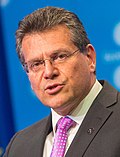| European Commissioner for Climate Action | |
|---|---|
| Member of | European Commission |
| Reports to | President of the European Commission |
| Term length | 5 years |
| Formation | 9 February 2010 |
| First holder | Connie Hedegaard |
The Commissioner for Climate Action is a post in the European Commission. It was created in 2010, [1] being split from the environmental portfolio to focus on fighting climate change. [1]
Contents
The European Union has made a number of moves in regard to climate change. Most notably it signed the Kyoto Protocol in 1998, set up its Emission Trading Scheme in 2005 and most recently agreed to unilaterally cut its greenhouse gas emissions by 20% by 2020. [2]
The current Commissioner for Climate Action is Wopke Hoekstra, who has succeeded the role after the resignation of Frans Timmermans. He also acts as Executive Vice-President of the European Commission for the European Green Deal, and Vice-President for Interinstitutional Relations and Foresight.





